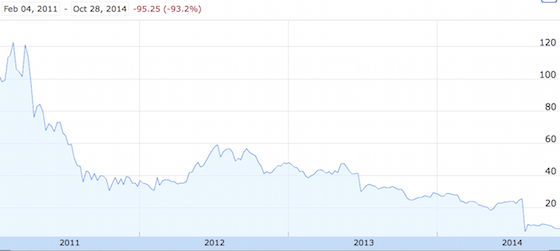Facebook wants publishers to become its junior partners, embedding their news and content into Facebook itself (at least on mobile) and sharing the ad revenue, The New York Times reported earlier this week.
New ad revenue always looks enticing in the digital space, where it’s hard to come by in meaningful chunks. But this is a deal that publishers, who are already too dependent on the social network, should turn down flat.
Here’s David Carr explanation of Facebook’s pitch:
The company has been on something of a listening tour with publishers, discussing better ways to collaborate. The social network has been eager to help publishers do a better job of servicing readers in the News Feed, including improving their approach to mobile in a variety of ways. One possibility it mentioned was for publishers to simply send pages to Facebook that would live inside the social network’s mobile app and be hosted by its servers; that way, they would load quickly with ads that Facebook sells. The revenue would be shared.
First, it’s hard to do a better job of servicing readers when you don’t know how to service them, much less when your readers don’t have control over their experience, or even realize they don’t have that control, as PressThink’s Jay Rosen points out. He notes that, “most users don’t grasp the basic fact that the Facebook algorithm is a filter. They think it’s just an ‘objective window into their social world.'”
A reader who gets his news via Facebook is a passive reader who at best is influencing the algorithm that selects the news he sees by choosing what to “like,” what to comment on, and who he’s friends with. News organizations need to, as best they can, cultivate active readers—ones who seek them out on a regular basis.
What Facebook is proposing is that publishers outsource the publishing to Facebook and become mere suppliers of content, much like Facebook’s billion-plus users. As Carr puts it, publishers would be “serfs in a kingdom that Facebook owns.”
That would just be cementing a partially existing arrangement. As I wrote earlier this year:
The control of distribution that was so profitable IRL hasn’t ended online. It just moved, passing from newspapers, TV stations, and the post office to the companies in (Marc) Andreessen’s portfolio, which happen to have zero cost of content: Google, Facebook, and Twitter (plus the ISPs)… The new digital monopolies all have hundreds of millions of people creating free content for them. That’s where the big profits are.
Facebook’s gross profit margin was 76 percent in 2013.
This might be a deal worth considering, though, if publishers had any formal say in how the news-feed algorithm operates and how it will change in the future. They don’t and they won’t. They would be beholden to Facebook’s secret algorithm, which is subject to the whims of Mark Zuckerberg & Co. alone. That’s extremely dangerous.
Two-and-a-half years ago, for instance, The Washington Post thought it had the social-media thing figured out. Its Facebook app, Social Reader, was sending millions of readers to washingtonpost.com by tricking Facebook users into spamming their friends’ news feeds with WaPo links. This was unethical, first, but it also was bad business, since it was entirely dependent on another company’s policies. When Facebook tweaked its proprietary algorithm, Social Reader’s traffic collapsed, and the Post pulled the app from the site within months.
The SEO wars came before that. Content farms like Demand Media (and to a lesser extent, the former New York Times Company unit About.com) rose to power on their skill (and shamelessness) in gaming Google’s search algorithm. Then Google tweaked its algorithm and sent the industry into free-fall. Here’s Demand’s stock performance since then:
There are other considerations, too. What tends to go big on Facebook is often at least in tension–if not at odds–with what qualifies as good journalism. A news industry formally intertwined with Facebook would be the news on Prozac. Positive stories tend to get shared more while negative or controversial stories get shared less. Nobody wants pictures of a jihadist wielding a knife next to photos of their daughter cutting her wedding cake.
The point is not that news organizations and other publishers can ignore Facebook and Google and the like. The point is that it’s intolerably risky to build their business models around them.
The Times makes an apt analogy, comparing Facebook’s ambitions to Amazon’s stranglehold on the book industry. Book publishers became too dependent on revenue from a single source, and then put the future of their business on Jeff Bezos’ platform, which has given him monopsony power over the book industry. The book business regretted this almost immediately, and went so far as to illegally collude with Apple to claw back some of their pricing power–but it was too late.
The news business, battered as it is, had better learn from these mistakes.
Ryan Chittum is a former Wall Street Journal reporter, and deputy editor of The Audit, CJR’s business section. If you see notable business journalism, give him a heads-up at rc2538@columbia.edu. Follow him on Twitter at @ryanchittum.

